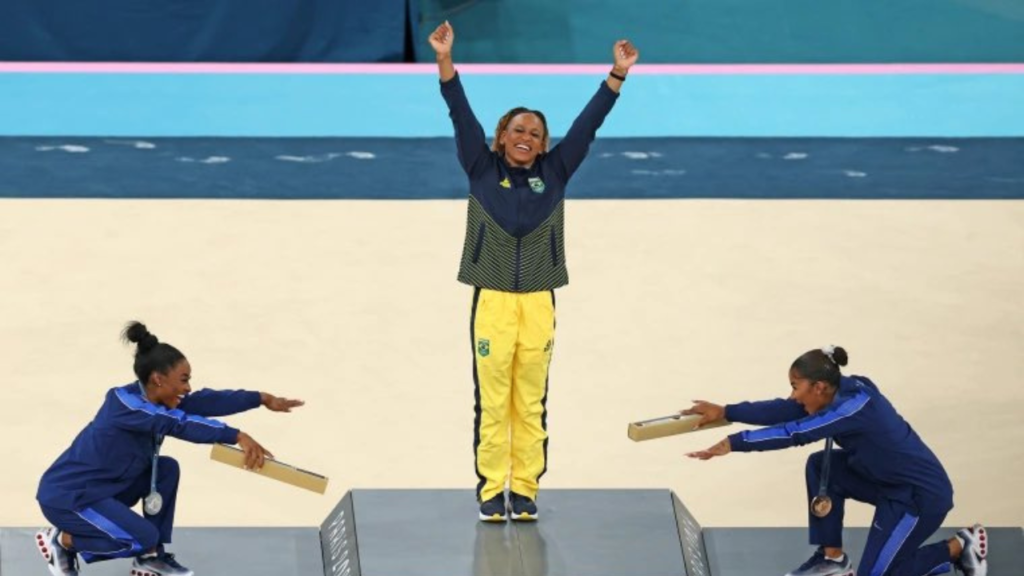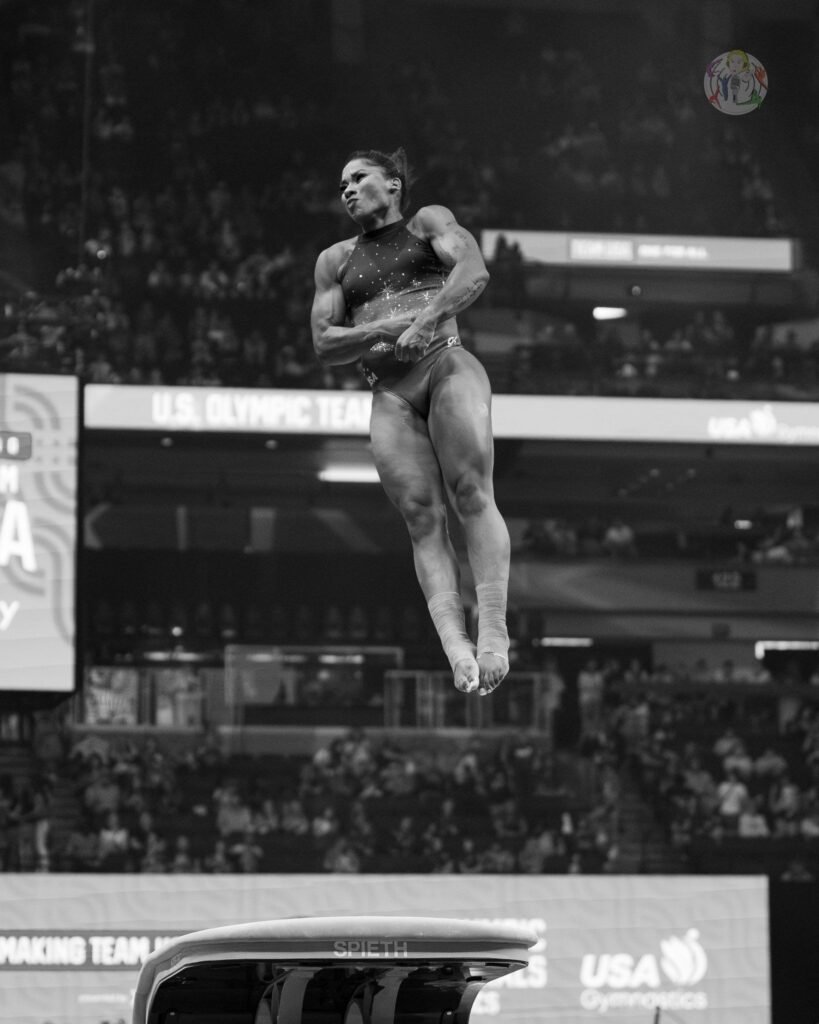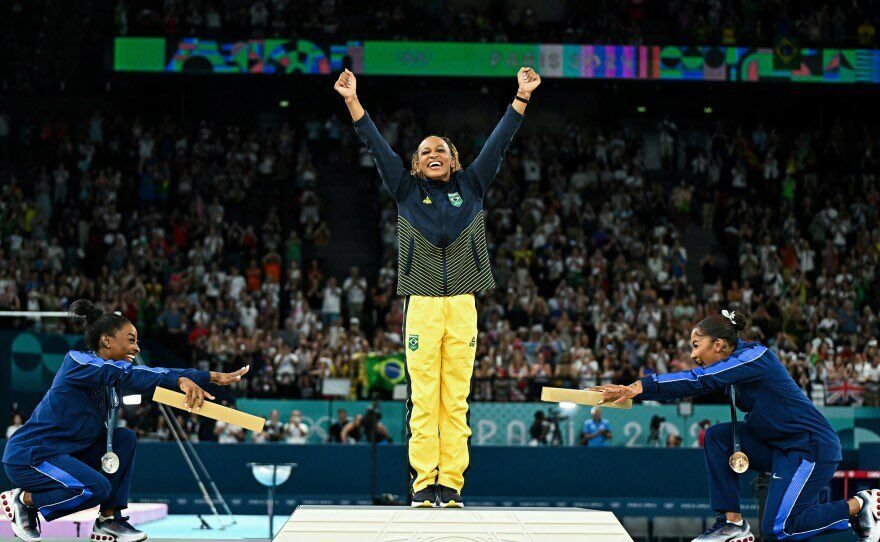Inside The Jordan Chiles Medal Dispute: What Happened?
- Leave a Comment
- William D
- August 11, 2024

American gymnast Jordan Chiles has been forced to return the bronze medal she won in the women’s floor exercise final of the 2024 Summer Olympics in Paris, in a remarkable turn of events.
The choice was taken in response to a Court of Arbitration for Sport (CAS) determination that Chiles’ score was handled incorrectly. Chiles’s effort originally won her the bronze, but later legal disputes and appeals have significantly altered the final rankings.
The dispute started when Chiles’ coaches submitted a request for information contesting the first grade that was given to her. After this appeal, the score was adjusted, moving her up from fifth to third and earning her the medal.
The Romanian Gymnastics Federation, however, disputed the appeal’s legitimacy, claiming that it was made after the deadline. Chiles’ score was restored to its initial position and she was consequently eliminated from the medal standings after CAS upheld this challenge.
The International Olympic Committee (IOC) has declared that Ana Barbosu of Romania will be the new recipient of the bronze medal as a result of this decision.
The IOC is working with the U.S. Olympic and Paralympic Committee and the Romanian Olympic Committee to arrange a reallocation ceremony for Barbosu and to make it easier for Chile to return his medal.
This choice has highlighted the complex nature of Olympic scoring and appeals and added another level of emotion and complexity to an already fierce battle.

The Debate Starts
Jordan Chiles won a bronze medal in the floor exercise at the 2024 Summer Olympics in Paris, following up his original highly praised performance. Chiles received a score of 13.766 from the judges for her engaging dance.
She finished in third place with this score, behind two gymnasts from Romania, Ana Barbosu and Sabrina Voinea. This bronze medal represented a major accomplishment and a turning point in Chiles’ gymnastics career.
But when Chiles’ updated score was contested by the Romanian Gymnastics Federation, things became more heated. The challenge originated from a request for modifications to Chiles’ routine’s Difficulty Value submitted by her coaches.
The Romanians contended that the investigation was submitted after the 60-second window allowed by the regulations of the International Gymnastics Federation (FIG). A legal fight that began with this challenge grew more intense as it proceeded through the arbitration procedure.
The Court of Arbitration for Sport (CAS) decided that Chiles’ score inquiry had been lodged improperly and sided with the Romanian Gymnastics Federation.
The inquiry was deemed invalid by CAS due to its submission being made four seconds after the stipulated deadline. Chiles was thus eliminated from the medal standings and her score was reset to its initial value of 13.666, placing her back in fifth place.
The outcome of the Olympics was significantly altered as a result of this CAS verdict. Chiles would no longer be the owner of the bronze medal, according to the FIG, which also assigned the IOC the responsibility of redistributing the medal.
The ruling stressed how closely procedural procedures must be followed and how difficult it is to resolve scoring disputes in high-stakes tournaments. In addition to changing the final standings, the decision has sparked a heated discussion on the impartiality and openness of the appeals procedure.
🇷🇴 A Romênia foi o ÚNICO país que peitou os resultados dos EUA nessa olimpíada.
— UpdateCharts (@updatecharts) August 10, 2024
Jordan Chiles não será obrigada a devolver o bronze, mas o nome dela NUNCA estará vinculado a esta medalha, apenas ao momento histórico com a Rebeca. #Paris2024 pic.twitter.com/Ss0a6PhZ6s
Effect and Response
The bronze medal’s reallocation signifies a happy and vindicated moment for Ana Barbosu. She felt she had lost out on a medal at first, but receiving the bronze from the IOC gave her a sense of accomplishment and approval.
In order to celebrate Barbosu’s accomplishment, the Romanian Gymnastics Federation is collaborating with the IOC to arrange an official reallocation ceremony. This ceremony will settle any doubts over the medal standings and give her performance a proper acknowledgement.
Jordan Chiles has experienced significant emotional and psychological effects. Her medal win being reversed has been a huge setback, particularly considering how her success was initially celebrated.
Chiles had to make the tough choice to stop using social media in order to save her mental health because of the harsh scrutiny and abuse she has received.
Athletes make personal sacrifices in their quest of excellence, which have been brought to light by the emotional toll of losing a hard-earned medal and the public response.
Chiles has received strong support from USA Gymnastics and the U.S. Olympic and Paralympic Committee (USOPC) in response to the scandal. They have denounced the harsh and irrational insults on her that have been made on social media.
The inquiry process was supported by both organizations, who claim it was carried out in good faith and in compliance with the guidelines established by the International Gymnastics Federation (FIG). Their remarks highlight Chiles’ honesty and the difficulties she has encountered during the conflict.
The collective response highlights the procedural and emotional complexity of Olympic sports. Although Barbosu’s accomplishment is praised, Chiles’ outstanding performance has been overshadowed by the dispute. The incident serves as a reminder of the larger problems surrounding scoring disputes and the extreme demands placed on players who are in the public eye.
Forever THAT GIRL ❤️ pic.twitter.com/U6ylsOxSuK
— Team USA (@TeamUSA) August 11, 2024
The dispute surrounding Jordan Chiles’ bronze medal highlights significant issues regarding the guidelines that regulate gymnastics contests.
In order to maintain fairness and accuracy in the scoring process, teams can contest decisions they feel are erroneous through the inquiry and appeal procedure. In this instance, Chiles’ coaches requested a new evaluation of the routine’s difficulty value through an inquiry.
But there are rigorous deadlines and procedural criteria for submitting these challenges, and breaking them can have serious consequences. This episode serves as a reminder of the difficulties involved in the appeals process and the possibility of disagreements if regulations are not strictly adhered to.
Such disputes affect athletes in ways that go beyond their immediate performance in competition. The psychological and emotional cost of losing a medal because of a procedure gone wrong can be very high.
A abrupt turnabout in performance can have a negative impact on an athlete’s mental health and self-esteem, as Chiles and other athletes have dedicated years of time and effort to their sport.
As a result of the harsh scrutiny and public backlash that frequently accompanies such confrontations, some athletes take precautions to safeguard their mental health, like Chiles did by removing herself from social media.
Concerns concerning the overall integrity of Olympic competitions are also raised by these situations. Even though the regulations are meant to maintain equity, the athletes’ accomplishments are occasionally overshadowed by the rigorous application of the rules and procedural nuances.
The spirit of fair competition and the substance of athletic performance can be undermined when mistakes are made in the scoring process or challenges to those scores become the main focus.
The inflexibility of the system can give rise to feelings of unfairness, particularly when the results affect the athletes’ reputations and careers.
Furthermore, it is debatable if the existing system effectively represents the interests of the athletes given how disagreements and appeals are handled. Sometimes, the emphasis on following procedures strictly may obscure the need for knowledge and adaptability in unusual situations.
This incident highlights the need for a reassessment of the procedures used to handle these types of disputes and whether the current ones may be modified to more effectively handle the intricacies of competitive sports while preserving fairness.
The Jordan The issue surrounding Chile’s gold offers a case study on the relationship between regulations, athlete welfare, and competition integrity. It emphasizes the necessity of a well-rounded strategy that guarantees justice while also taking into account the human factor.
There may be requests for improvements that address the procedural difficulties and improve the support networks available to athletes resolving conflicts of this nature as the gymnastics community considers this circumstance.

Conclusion:
The dispute surrounding Jordan Chiles’ bronze medal is a powerful illustration of how complex and difficult competitive gymnastics can be.
The choice to take away Chiles’ medal and give it to Ana Barbosu has changed the women’s floor exercise final standings and brought attention to the wider ramifications of scoring disagreements in competitive settings.
This controversy highlights how crucial it is to follow procedural guidelines, but it also highlights the emotional and psychological toll that these disagreements may take on players.
This controversy is more important than just what it means for the players concerned. It draws attention to the necessity of approaching disagreements and appeals within the Olympic framework in a more sophisticated manner.
While timelines and regulations are essential for preserving justice, their inflexibility can occasionally result in outcomes that seem unfair, especially when they take precedence over the athletes’ achievements and well-being.
This incident serves as a reminder of the necessity to strike a balance between close adherence to the law and a more thorough comprehension of the human aspects involved.
Future developments in the systems that handle scoring disputes and athlete support are obviously needed. Even though the current framework is intended to maintain justice, more adaptability and compassion could be beneficial.
Improving the support networks for players coping with the aftermath of these kinds of scandals helps lessen the psychological impact and preserve the sportsmanship of the game.
A more equal and encouraging atmosphere for all competitors might also result from reforming the appeals procedure to better handle exceptional circumstances and offer more precise rules.
The Jordan Chiles case highlights the necessity of handling competition issues with consideration and balance. Both the gymnastics community and Olympic authorities may strive toward a system that better supports athletes and respects the spirit of fair competition by addressing the procedural and emotional problems brought to light by this dispute.
